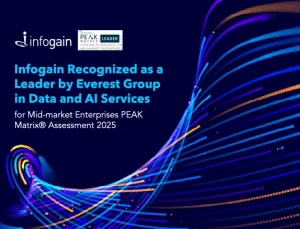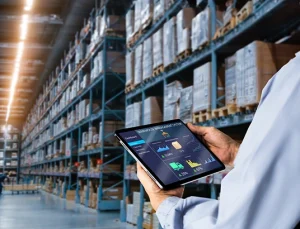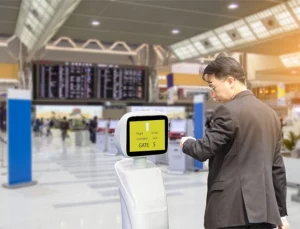- Posted on : September 2, 2016
-
- Industry : Human Resource
- Type: News

Move over Bond stories. The tech-enabled devices nowadays help in process smoothening right from attendance, to recording of timesheets, even availability of meeting rooms. These overtly simplifying things are helping employees to be more productive.
Move over Bond stories. The tech-enabled devices or Internet of Things (IoT) nowadays help in process smoothening way better than you can think of. Infogain has developed a mobile application for the employee to simplify the attendance process and recording of Timesheet. All of this is done using beacon technology. Keyuri Singh, VP-HR at Infogain shares how it’s done.
- Attendance: With the help of the mobile application, the attendance of the employee gets recorded as he enters the premises of the organisation. The login and logout time gets registered at the entry and exit. There is no need for access cards as the mobile application will do the needful.
- Registering meetings & trainings: One of the tedious task of employees is to fill a timesheet in a technology company. With the help of this application any meeting or training attended by an employee will be registered immediately by considering the actual hours spent on trainings and discussions based on the location of the user.
- Track the colleague: The application helps to identify and track the location of the specific user.
- Identify the availability of meeting rooms: The mobile application will help to identify the availability of the nearest meeting or training room depending upon the occupancy. This will help book meeting rooms for an unplanned meeting on the go, the app will also show you the direction to the meeting room, thus help you to reach there without taking any help. This is particularly useful for offices in large premises, where indoor navigation remains a challenge.
Infogain also uses Yammer for social collaboration within the enterprise.
Kronos Inc developed tech-devises which employees of any organizations can use to check-in and check-out using their mobile phones when in proximity of their offices. Kronos employees use their own integrated IT systems which make their lives productive and allow for seamless opportunities to work from home or from the beach if they want to. A single sign-on helps access all applications including HR systems like Performance management, workforce management through one entry.
According to Parag Arora, Area Vice President & Country Head, India sub-continent at Citrix Systems, “According to Gartner, by 2020, 26 billion ‘things’ will be connected. Identifying this opportunity, in 2014 Citrix acquired Octoblu, an IoT platform that makes it possible for the Enterprise to simply connect together many different disparate elements within their business through automated workflows, and leverage these workflows to better understand how their business operates. Thus, not just helping in reducing the time consumed in processes by making them seamless but also increasing the productivity of employees.”
Investment is not a deterrent, as organizations are willing to spend on the new-age tech-devises since it amps the productivity and the ROI is very high. It is estimated that with the availability of cheap sensors, low cost of bandwidth and declining processing costs and the availability of smartphones, investments would be much lower.
And IoT will also mean that organizations will need data scientists to manage all the data that’s being generated. And will that also mean a few taken-for-granted jobs will be sidelined? Keyuri believes that reskilling is the major concern area for the organizations with IoTs and likewise new forms of jobs will also get tailored. “No doubt that IoT brings up a culture of automation, where Machine to Machine (M2M) collaboration would be strong and would require low human interfaces. This may need reskilling of some employees and many routine jobs will get side lined / chopped – these could be technical writing, telemarketers, accountants, retail workers, and real estate sales agents, legal workers. It also needs deciphering huge data, people skilled in latest emerging technologies, data scientists and people with an entrepreneurial mind set would be in demand. New professions will be in demand –data security experts, wearable tech designers, cloud computing specialists, medical robot designers,” she adds. Parag also echoes the same. “In the future, we can expect IoT to generate entirely new job roles and titles and to completely change the way we commute, communicate and collaborate. Organizations should view this fast approaching transition as a natural evolution and embrace its positive influence,” he said.
Security concerns & privacy
At Kronos, “maintaining customer and employee data privacy is a paramount and we have and continue to invest in the best data security to ensure this outcome. We have never had a data leakage and we regularly test our systems and technology to assess the security,” said Rajiv Burman, Senior Director and Head Human Resource, APAC. It is an important concern since security is a critical challenge, believe the experts. And employees might not even like th idea of constantly being judged, tracked. It should be a prerogative of the company to at least make the tech-devises work only in the office premises. Keyuri believes, “For organizations, it is imperative that they provide a clear guideline on how this is going to improve employee productivity and help them to be more efficient. Organizations can also provide some incentive for employees who follow the instructions and bring in further efficiency.”
But the IoT brings a lot of positive developments for business, and as Rajiv said, “The Internet of things is the way of the future and it offers tremendous opportunities to businesses, customers and employees for greater productivity and opportunities for growth.”






